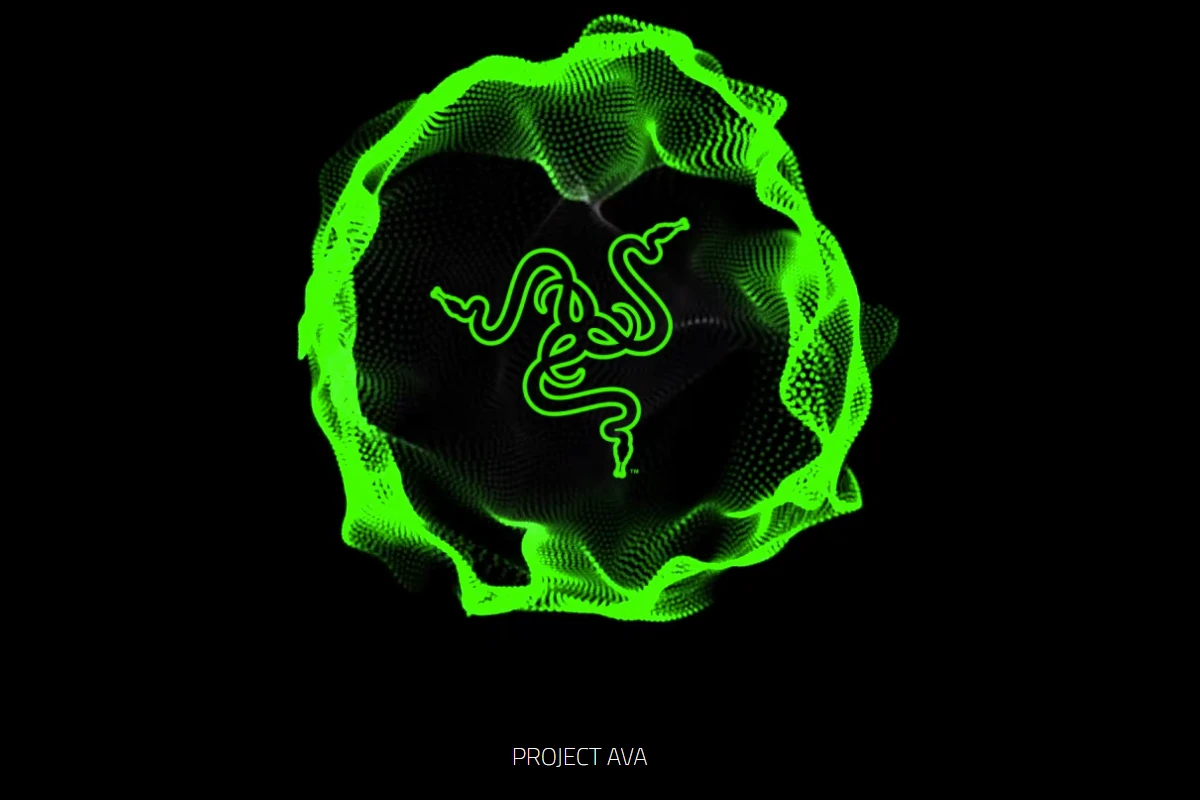Razer has introduced Project Ava, an AI gaming assistant designed to provide real-time guidance to players. This innovation has sparked discussions about its ethical implications, raising questions about the distinction between assistance and cheating. Because the Ai will feed you information and tips in real-time, there’s a bit of debate over whether this is fair play or basically cheating (and whether or not it should be allowed when gaming online versus others who aren’t using it).
Ava analyzes player behavior and offers tips based on learning from professional gamers and other players. While its impact on various games remains uncertain, it is expected to be utilized in large online games. The introduction of AI in gaming, including features like smarter enemies, prompts speculation about the evolving nature of skill and gameplay in the future.
Understanding Razer’s Project Ava
What is Project Ava?
Razer’s Project Ava is an AI-powered gaming assistant. It aims to help players improve by giving real-time advice during gameplay. Ava analyzes game footage, player actions, and game data. Then, it offers suggestions on strategy, item use, and even in-game moves. Think of it as a coach that watches you play and gives tips as you go.
How Does Ava Work?
Ava uses machine learning to learn from various sources. These include:
- Pro player strategies
- Community guides
- Real-time game data
By combining these sources, Ava gives data-driven advice. This advice can range from simple tips to complex strategic plans. Ava also offers post-game analysis. This helps players see where they did well and where they can improve.
The Controversy: Fair Play or Cheating?
The main debate around Project Ava is whether it gives an unfair advantage. Some gamers think it crosses the line between helpful tool and cheating. Their concerns are:
- It makes games too easy.
- It ruins the sense of accomplishment.
- It creates an uneven playing field in competitive games.
Others see Ava as a valuable learning tool. They argue it can help new players learn faster and help all players improve their skills. They also point out that many games already have built-in help systems.
Comparing Ava to Other Gaming Aids
Ava is different from other gaming aids because it gives real-time, personalized advice. Here’s a quick comparison:
| Gaming Aid | Description | Real-Time Advice? |
|---|---|---|
| In-game tutorials | Basic instructions provided by the game. | No |
| Online guides and wikis | Player-created guides and information. | No |
| Gaming mice with macro buttons | Programmable buttons for complex actions. | No |
| Razer’s Project Ava | AI-powered real-time coaching. | Yes |
What Games Will Ava Support?
Razer hasn’t said exactly which games Ava will support. It will likely focus on popular competitive games and those with complex strategies. This could include games in genres like:
- Multiplayer online battle arenas (MOBAs)
- First-person shooters (FPS)
- Real-time strategy (RTS)
The Future of AI in Gaming
Project Ava is part of a larger trend of using AI in gaming. Other examples include:
- AI-controlled opponents that learn and adapt.
- AI tools for game development.
- AI-powered esports commentators.
These advances raise questions about the future of gaming. Will AI change how we play and how we think about skill? Only time will tell.
Beyond Ava: AI and Accessibility in Gaming
Beyond performance enhancement, AI has the potential to make gaming more accessible. For players with disabilities, AI can offer customized control schemes, adaptive difficulty, and real-time assistance. For example, AI could analyze a player’s inputs and adjust the game’s difficulty dynamically, ensuring a challenging yet manageable experience. AI could also provide real-time translations of in-game text and audio, breaking down language barriers and allowing more people to enjoy games from around the world. This focus on accessibility is a crucial aspect of AI’s growing role in the gaming industry, opening up new possibilities for players of all abilities.
Short Summary:
- Razer’s Project Ava aims to assist gamers by offering live commentary and coaching.
- The AI model, built on Meta’s Llama, raises ethical questions regarding its use in competitive settings.
- Ava offers features like post-game analysis, graphical optimization, and real-time game tips.
Razer, a leading name in gaming hardware, unveiled its latest project, aptly named Project Ava, during the highly anticipated CES 2025 event. This AI-powered tool promises to be every gamer’s ultimate companion, taking on roles ranging from a supportive coach to an expert guide. The potential of Ava to revolutionize the gaming experience is exciting, yet it comes with a whirlwind of ethical debates regarding its influence during competitions.
Described as “the ultimate AI gaming copilot,” Razer presented Ava as capable of providing invaluable advice in real-time. With functions designed to help gamers navigate complex challenges, it can generate post-game reports, suggest strategic enhancements, and assist players in learning from their gameplay. The company envisions Ava enabling players to excel across various games by offering insights derived from collective community knowledge.
“By analyzing millions of simulations within seconds, I’ll always have an answer to your toughest gaming challenges,” boasts a Razer marketing video, highlighting Ava’s advanced capabilities.
While Razer is known for showcasing conceptual products at CES, past demonstrations have sometimes turned into commercially viable devices. A notable example includes their controversial RGB face mask from 2021, which sparked discussion around the accuracy of its health certifications. Project Ava, however, promises to stir its own brand of controversy, particularly around the notion of fairness in competitive gaming.
The Mechanics Behind Ava
Project Ava operates on Meta’s open-source AI model, Llama, and has been specifically trained on gaming data to enhance its functionality. Gamers can expect the AI to recognize game-specific patterns, suggest tactics, and even assist in puzzle solving during gameplay. Demonstrations included scenes from popular titles like Black Myth: Wukong where Ava interacted smoothly, advising players on optimal strategies.
During a hands-on segment, Razer showcased how Ava could advise a player on effective tactics during a boss battle, mentioning critical attacks to avoid and encouraging players to manage enemy health efficiently. This seamless integration may entice casual gamers, but it raises complex questions concerning the blend of suggestion and autonomy in gameplay.
Ethical Concerns and Community Impacts
With the rise of such technologies comes a pressing need to examine their implications. Razer acknowledges these concerns yet emphasizes that Project Ava is still in the conceptual phase.
“Currently, Project Ava is only available as an internal concept demo,”
Razer stated, indicating their awareness of these ethical challenges. They highlight that should it move into development, the company plans to collaborate with game developers and ensure all data sources are vetted for legality.
However, a major ethical dilemma emerges around the very nature of assistance in gaming. When does help cross the line into cheating? Traditionally, players might refer to guides during gameplay, but having a live coach in their ears could significantly alter the competitive landscape. Razer illustrates this through a practical example: if a player is equipped with pre-determined optimal strategies in a competitive setting, it may skew the fairness of the match.
Moreover, the concern about where Ava gathers its knowledge remains unresolved. Will it harvest tips from established online guides without crediting their creators? How will they address potential issues related to intellectual property? Critics argue that while AI might enrich gameplay, its reliance on existing data calls for careful navigation of copyright and citation.
Technological Aspirations and Future Prospects
Project Ava’s multifaceted approach allows it to assist players in numerous ways. Whether helping a user configure game settings for peak performance, managing in-game strategies, or analyzing post-match performance, the potential operational scope is vast. Razer envisions improvements such as single-click optimization for both hardware and game graphics, ensuring players are equipped for the best possible experience.
Details on Ava’s workings reveal sophisticated capabilities, including leveraging community insights and even grasping player tendencies to tailor advice. Razer has incorporated analysis of event logs, benchmark statistics, and personal player performance to deepen Ava’s understanding and subsequent suggestions.
With Razer committed to turning this concept into a product, they are aligning themselves to lead in the intersecting fields of AI and gaming.
“We are building out a whole team of AI developers to work on such ideas,”
explained David Ng, Razer’s global marketing director. He hinted at a larger announcement at the upcoming Game Developers Conference (GDC) in March.
However, Razer is also aware that the introduction of such technology necessitates ongoing dialogue within the gaming community about fairness and compliance. As players grow accustomed to such enhancements, finding consensus on acceptable help versus cheating will be imperative for esports organizations, tournament organizers, and the broader gaming culture.







